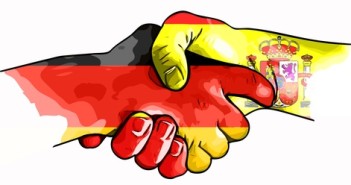Exit polls in Germany show a clear victory for Angela Merkel’s CDU/CSU coalition, with the best result since 1990.With 42% of the votes and a 5% entry threshold, she could command an absolute majority in parliament.Â
Two small right wing parties are swinging between entering the parliament and staying out. Their fate could make a big difference for Germany and Europe. The real, full results are eagerly awaited. The euro’s celebration when markets open could be short-lived, as uncertainty is high.
FDP is Merkel’s current junior coalition partner and will probably stay out of parliament. The small party receives only 4.5% in exit polls, and the margin of error is small.
AfD, Alternative for Germany, is a new anti-euro party that receives 4.9% according to exit polls. They could get into the parliament. The main opposition party, center-left SPD is projected to win 25.8%. The left-leaning Greens are headed for around 8% and Die Linke, “The Left†are in for 8.5%. Exit polls by both ARD and ZDF show very similar results.
Here are 6 scenarios:
- Absolute majority: Medium probability. if Merkel’s CDU/CSU coalition wins an absolute majority, then she isn’t expected to look for coalition partners. If this is confirmed, the new government’s composition will be clear. In theory, it is easier to rule without partners. However, she might be reliant on the hard line, euro-skeptic members of her party, that might make trouble despite knowing that Merkel is the party’s biggest asset.
- Grand coalition: Medium probability. Assuming no absolute majority, Merkel could turn to the biggest opposition party, SPD and have a big coalition like in her first government. This is what most Germans want. Such a government would be very pro-European, but the SPD might keep her busy in order to distinguish themselves: after serving under Merkel from 2005, many saw them as redundant, and they were beaten in 2009 and never came back their grand days.
- CDU-Green coalition: Medium probability. The Green party is left of the center left SPD and it wouldn’t make sense for these parties to partner. However, after Merkel made a 180 degrees U-turn regarding nuclear energy after the Fukishima disaster, and now opposes nuclear energy, this coalition cannot be ruled out. The pro-euro greens would balance anti-euro hardliners in the CDU and CSU.
- CDU-AfD coalition: Low probability. It is hard to see Merkel going with an anti-European party, but the voters of both parties are not necessarily that far away.
- CDU-FDP repeat: Low chances due to the low chances of FDP entering parliament.
- SPD-Green-The Left coalition: Low probability. The SPD has ruled out partnering with Die Linke – The Left party, but in case CDU/CSU doesn’t win an absolute majority and if AfD and FDP stay out, politicians can change their ways.
In general, there are very high chances that Merkel will continue, as expected, but there is huge uncertainty regarding the government.
The euro might rise at first on Merkel’s victory, but retrace on the uncertainty.
For more, see the EURUSD forecast.



